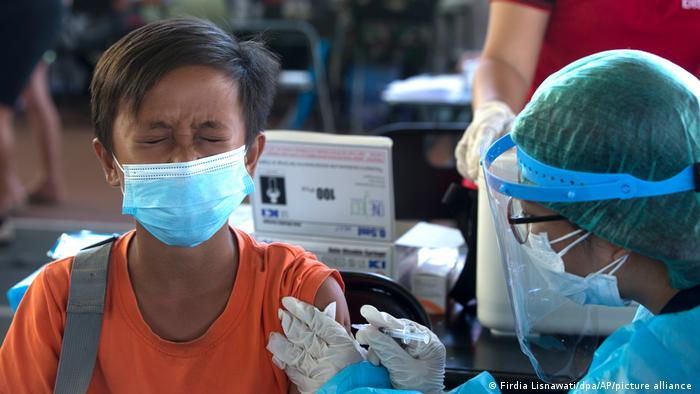Even as the national government has said it is still “too early” to vaccinate children against Covid-19, the city government of Manila says it is now preparing to inoculate children who are most vulnerable to the virus.
The City of Manila will begin accepting in its Covid-19 vaccine registration system individuals 12 to 17 years old, pending approval of the national government to inoculate minors.
Like its open policy for adults, the city government on Sunday (September 12) said it would inoculate members of this age group even from outside Manila.
Manila City Mayor Francisco “Isko Moreno” Domagoso said they would have to wait for the go-signal from the national government before administering the shots.
It had been repeatedly reported that unvaccinated children (since there is yet no approval to vaccinate them) are the ones most susceptible to Covid-19, particularly the Delta variant, with many of those infected getting seriously ill or dying during hospitalization.
Recent data on coronavirus infections are belying the previously widespread belief that the young, especially children, were at a lower level of risk because of their strong immune system.
Numbers available everywhere, including the Philippines, showed that children were increasingly becoming infected especially with Delta, the more contagious variant of SARS Cov2, the virus that causes Covid-19.
The Department of Health (DOH) has not yet declared community transmission of Delta, stressing the need for more evidence.
Despite the absence of a government declaration, however, the group Save the Children Philippines (SCP) said it was seriously concerned about the increase in reported Covid cases among the young—19 years or younger.
Cases rising in pediatric age group
“We can see from the data that cases are rising in the pediatric age group,” said Dr. Kaydee Doloroso.
These numbers, she said, should prompt all individuals to heed health protocols against coronavirus infection, according to an earlier Inquirer report.
Last week, infectious disease expert Dr. Rontgene Solante said that with the Delta variant being highly contagious, infections will “exempt” no one, not even children.
SCP said that while children are not considered part of “high-risk groups” and that most of the young who had been infected with coronavirus get “mild” Covid cases, it was concerned, especially with the Delta variant being “more fatal to children.”
Dr. Cecilia Francisco, of SCP, said the disease puts children at risk, especially those with preexisting health conditions, and those below one-year-old because their immune response was either “compromised or not yet developed.”
“Children with Covid-19 generally have milder effects and better prognosis than adults but those who have underlying diseases have higher risks of experiencing severe illnesses,” she said.
The DoH reported last August 22 that 200,901 young Filipinos aged 19 years old and below got COVID since the pandemic struck in 2020—35,759 (0 to 4 years old), 37,287 (5 to 9 years old), 51,033 (10 to 14 years old) and 76,822 (15 to 19 years old).
The DOH said 183,747 have already recovered—32,255 (0 to 4 years old), 33,963 (5 to 9 years old), 46,788 (10 to 14 years old), and 70,741 (15 to 19 years old).But 510 children died since 2020 from COVID 19.
Since the beginning of the health crisis, 510 children, mostly 4 years old and below, have died because of the disease—254 (0 to 4 years old), 40 (5 to 9 years old), 75 (10 to 14 years old) and 141 (15 to 19 years old).
Increased risk
The US Center for Disease Control and Prevention (CDC) said evidence had shown that, compared to adults, children were likely to have similar viral loads in their nasopharynx and were more likely to transmit the virus to others. In other words, the virus had turned children into most likely carriers.
The virus’ incubation period in children is 2 to 14 days with symptoms that include fever, fatigue, headache, myalgia, cough, nasal congestion, loss of taste or smell, sore throat, shortness of breath or difficulty breathing, abdominal pain, diarrhea, nausea, and poor appetite.
The CDC said that the most common symptoms in children are cough or fever or a combination of those. But for children with existing medical conditions and those aged one year old and below, there is an increased risk for severe illness.
“Similar to adults, children with severe Covid-19 may develop respiratory failure, myocarditis, shock, acute renal failure, coagulopathy, and multi-organ system failure,” said CDC.
It added that children with Covid-19 were also at risk of developing Multisystem Inflammatory Syndrome in Children (MIS-C)—a rare inflammatory condition in children with the disease.
CDC had likened the transmissibility of the Delta variant to chickenpox, which was 90 percent transmissible from an infected person to others.
According to the Philippine Pediatric Society (PPS), 20 percent of children who were hospitalized because of COVID-19 have pre-existing health conditions.
Earlier this month, children sick with Covid-19, especially those with prior illnesses, had become a growing concern at the Philippine General Hospital where three children were said to be in critical condition.
The Food and Drug Administration approved last week the use of Moderna vaccines for people as young as 12, just as it had earlier for Pfizer.
As of Sunday, the Manila government said it had fully vaccinated 1 million individuals in the city, representing 74 percent of its population.
Tags: #ManilaCity, #Covid19, #Covid19vaccine, #Deltavariant, #minors
